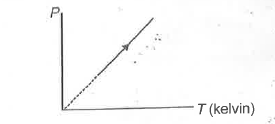Internal pressure of a perfect gas (ideal gas) is:
Zero
infinite
Calculated by PV=nRT
Can not say directally
The correct Answer is:A
Step-by-Step Solution:
1. Understanding Internal Pressure: Internal pressure is defined as the change in internal energy (U) with respect to volume (V) at constant temperature. Mathematically, it can be expressed as:
π=(∂U∂V)T
2. Characteristics of an Ideal Gas: An ideal gas is a theoretical gas composed of many particles that are in constant random motion and do not interact with each other except during elastic collisions. This means that there are no intermolecular forces acting between the gas molecules.
3. Internal Energy and Volume: For an ideal gas, the internal energy (U) is a function of temperature (T) only and is independent of volume (V). This implies that:
U=U(T)
Therefore, the change in internal energy with respect to volume at constant temperature is zero:
(∂U∂V)T=0
4. Conclusion on Internal Pressure: Since the change in internal energy with respect to volume is zero, we can conclude that the internal pressure of an ideal gas is:
π=0
5. Final Answer: The internal pressure of a perfect gas (ideal gas) is 0.
---
π=(∂U∂V)T
U=U(T)
Therefore, the change in internal energy with respect to volume at constant temperature is zero:
(∂U∂V)T=0
π=0
Topper's Solved these Questions
- THERMODYNAMICSBOOK - RESONANCE ENGLISHCHAPTER - THERMODYNAMICSEXERCISE - Exercise -2 Part-I: Only one option correct type
23 Videos
- THERMODYNAMICSBOOK - RESONANCE ENGLISHCHAPTER - THERMODYNAMICSEXERCISE - Exercise-2 II: Single and double value integer type
16 Videos
- THERMODYNAMICSBOOK - RESONANCE ENGLISHCHAPTER - THERMODYNAMICSEXERCISE - H-1
1 Videos
- TEST SERIESBOOK - RESONANCE ENGLISHCHAPTER - TEST SERIESEXERCISE - CHEMISTRY
50 Videos
Similar Questions
The internal pressure loss of 1mol of van der Waals gas over an ideal gas is equal to
View SolutionPressure exerted by a perfect gas is equal to
View SolutionIf E is the energy density in an ideal gas, then the pressure of the ideal gas is
View SolutionThe internal energy of one mole of ideal gas is
View SolutionInternal energy of two moles of an ideal gas at a temperature of 127∘Cis1200R. Then find the molar specific heat of the gas at constant pressure?
View SolutionIn a process, the pressure of an ideal gas is proportional to square of the volume of the gas. If the temperature of the gas increases in this process, then work done by this gas
View SolutionInternal energy of two moles of an ideal gas at temperature of 27∘C is 1200R. Then find the molar specific heat of the has at constant pressure ?
View SolutionThe graph of pressure and temperature for an ideal gas is as shown in figure. The given process is

View SolutionThe internal pressure loss of one mole of vander Waal gas over an ideal gas is equal to
View SolutionIf pressure and temperature of an ideal gas are doubled and volume is halved, the number of molecules of the gas
View Solution
